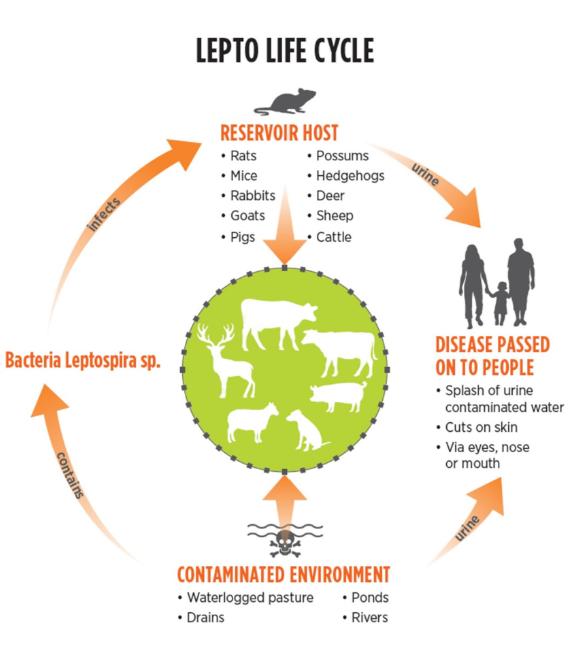Lepto Update:
HOW DOES IT SPREAD?
Leptospirosis thrives in and can survive for up to 6 months in damp soil, stagnant water, streams, ponds, boggy areas and can spread rapidly after heavy rain or flooding. Livestock become infected by contact with water or grazing pasture contaminated with urine from infected animals. When cows are close together, they can infect each other via urine, particularly in the milking shed.
In humans, exposure to urine presents the highest risk. Bacteria can enter the body via cuts and abrasions, or contact through the mucosa of eyes, nose and mouth. It is not only people directly in contact with stock that are at risk or developing infection, but also the family members of those people also
HOW BAD IS IT?
Leptospirosis is a serious disease and causes debilitating illness in people. Rates of leptospirosis in NZ are high by international standards.
Symptoms can range from mild flu-like sickness to life threatening kidney and liver damage. Approximately 50% of lepto. cases end up in hospital with a quarter of these in ICU. Many people have severe ongoing illness, including chronic fatigue. If you would like to hear a personal story of the health effects of lepto, have a chat with our vet John.
YOUR RESPONSIBILITY
Under the ‘Health and Safety at Work Act’, employers have a responsibility to manage the health and safety risks on their farm, this includes taking preventative measures for leptospirosis. The most effective ways to achieve this on farm is by providing staff with adequate PPE when working with stock (gloves, waterproof overalls, waterproof footwear and suitable handwashing facilities), educating staff about leptospirosis; what it is and how they should take precautions to prevent exposure, and vaccinating stock.
VACCINATION
There are a couple of options available when it comes to vaccinating our cattle against Leptospirosis. Historically, a two or three-way vaccine has been used (such as Zoetis Leptoshield or 7in1 vaccine) and this year a four-way vaccine has been developed which is expected to provide protection against a further strain of Lepto called Leptospirosis Pacifica. This is a novel strain of Lepto. that has been identified in New Zealand.
The most important things to consider when vaccinating is:
• Adequate handling and storage of the vaccine
• Correct administration of the vaccine (i.e. correct dose) to all animals
• Following the recommended vaccination protocol for all classes of stock (annual boosters for all stock)
If you decide to implement the four-way vaccination on your farm, then it is important to remember that all animals will need to be sensitised to the Pacifica strain, so this means that each individual will need to receive two doses initially (4 - 6 weeks apart) followed by annual boosters.


